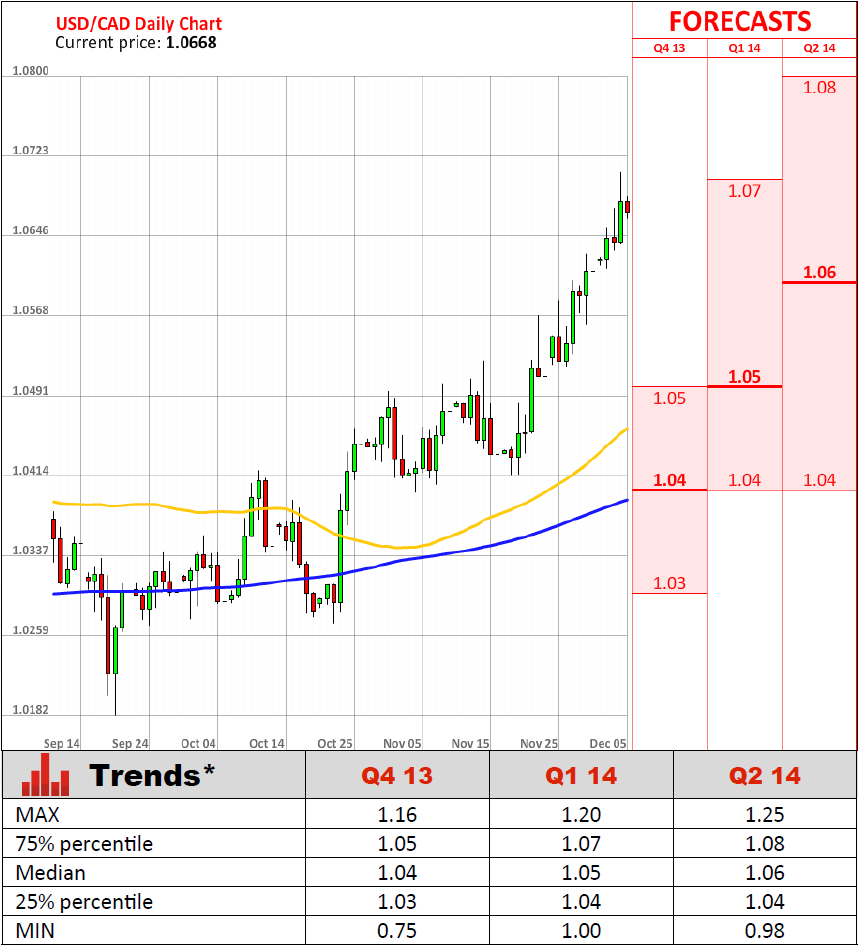Note: This section contains information in English only.

Thu, 05 Dec 2013 11:33:03 GMT
Source: Dukascopy Bank SA
"The Bank judges that the substantial monetary policy stimulus currently in place remains appropriate. The risks associated with elevated household imbalances have not materially changed, while the downside risks to inflation appear to be greater."
- Stephen Poloz, Bank of Canada Governor
Canadian trade balance unexpectedly turned into surplus for the first time in 22 months in October, as the total value of imports fell for a second straight month. Statistics Canada said the country logged a surplus of $75.0 million after a revised deficit of $303 million a month earlier. Analysts, however, expected a shortfall of $770 million. Shipments from the country sank 0.3%, while imports plunged 1.2%.
Despite welcoming signs from the trade sector, the Bank of Canada decided to keep interest rates unchanged at 1%, citing weak inflationary pressure, disappointing exports and elevated household imbalances. Even though the majority of analysts expected the central bank to stay pat on the policy, the decision came as a surprise to some market participants after Poloz's comments in October, when he pointed out there is a need to raise interest rates in the future. The world's 11th largest economy is not expected to reach its full capacity until the end of 2015, meanwhile, Poloz counts on higher investment and exports to drive the growth, instead of relying on debt-laden consumers. At the same time the economy posted a solid 2.7% growth in the third quarter, although the BoC does not consider it as a sign of rebalancing towards investment and exports.
© Dukascopy Bank SA
Actual Topics
Subscribe to "Fundamental Analysis" feed
Subscribe
Per scoprire di più sulla piattaforma di Dukascopy Bank per Forex/CFD, sul SWFX ed altre informazioni relative al trading,
la preghiamo di contattarci o richiedere di essere contattato (callback request)
la preghiamo di contattarci o richiedere di essere contattato (callback request)
For further information regarding potential cooperation,
please call us or make callback request.
please call us or make callback request.
To learn more about Dukascopy Bank Binary Options
/ Forex trading platform, SWFX and other trading related information,
please call us or make callback request.
please call us or make callback request.
Per scoprire di più sulla piattaforma di Dukascopy Bank per Forex/CFD, sul SWFX ed altre informazioni relative al trading,
la preghiamo di contattarci o richiedere di essere contattato (callback request).
la preghiamo di contattarci o richiedere di essere contattato (callback request).
To learn more about Crypto Trading / CFD / Forex trading platform, SWFX and other trading related information,
please call us or make callback request.
please call us or make callback request.
To learn more about Business Introducer and other trading related information,
please call us or make callback request.
please call us or make callback request.
For further information regarding potential cooperation,
please call us or make callback request.
please call us or make callback request.